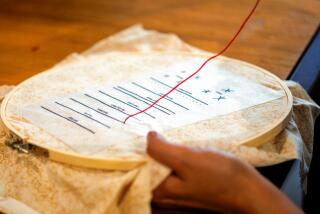Expert Advice Led to Quilt Maker’s Success
(Starting today, The Times begins a weekly column on small business. It will appear Fridays in the Business section.)
Andrea Totten’s son, Cameron, was so much a part of his mother’s quilt-making business that he learned his colors by sorting fabric squares. One day, the toddler pointed up to a cloudy sky. “He said, Mommy, look at the polyester up there!” recalls Totten. It was then that she realized that her business and her life had merged.
For the past 18 years, Rags to Riches, her custom bedding business, has flourished despite a series of troubles that suddenly loomed large for Totten and continue to plague other inexperienced small business owners.
Rags to Riches produces handmade quilts, pillows and bedding in a Pasadena factory. Most ensembles are custom-made to match a client’s bedroom. Its Sweet Pea baby quilt collection is geared to older, affluent parents willing to spend $300 to $500 on linens for the nursery.
“My company has survived in spite of me,” said Totten, a woman with a deep, rich laugh.
Totten said her troubles began soon after she moved her quilts from the dining room table to the garage and hired a few people to help her sew. To her surprise, Pasadena city zoning officials cited her for operating a business in a residential neighborhood. Although her neighbors signed a petition supporting her quilt-making efforts, she agreed to move out rather than seek a zoning variance.
Later on, she was forced to leave a good location because she failed to read the fine print and signed a lease without an option to renew.
Thirteen years ago, when she was short on cash, she paid her fabric suppliers instead of her taxes. An understanding Internal Revenue Service agent gave her a second chance by allowing her to make payments of $100 a week.
All these problems seemed insurmountable at the time, but she managed to hang on.
Totten said the most valuable lesson she learned was to be honest about what you don’t know and seek expert advice. Now, before she makes any important decisions, she consults her “two Howards,” her lawyer and her accountant.
The biggest problem she faces now is raising money to expand so the company can keep up with the orders. She said she is negotiating with a financial partner who would continue to give her a free hand in running the company while providing the necessary cash to grow.
This year, Rags to Riches expects to gross about $1.5 million. Totten says her success still surprises her, especially since she barely passed a junior high school sewing class.
“My family thinks it’s so funny that I’m in this business because it was my sister who always made and embroidered beautiful clothes for her children,” said Totten.
According to retailers, Totten’s unique designs and fabric choices have made her a shining light in the home fashion business.
“Most bedding manufacturers play it safe and copy each other. Andrea is creating a new masterpiece every time,” said Eva Levine, owner of Country Linens Inc. in the Sherman Oaks Fashion Square shopping center.
“We do a tremendous business on her products. For the past 12 or 13 years, sales have increased every year,” said Levine, who is designing a new, larger store that will permit her to feature the entire Rags to Riches adult bedding and Sweet Pea baby bedding line. “She’s been an integral part of my success.”
Although Totten relies on traditional quilt patterns, her colors and fabrics are inspired by fashion trends. This year’s favorite hues are jade green and dusty rose. White is in--ecru is out. Totten avoids gingham checks and cute baby prints, instead choosing florals and subtle, sophisticated fabrics for her Sweet Pea baby collection.
Both adult and juvenile quilts feature special touches such as custom-designed eyelet lace hand-threaded with ribbons. Many quilts are reversible with double ruffles of coordinated colors. The baby quilts feature appliqued ballet slippers, animals and trains cut from satin.
The price of the quilts handcrafted by Totten’s 30 employees may shock people who grew up with a $19.95 chenille bedspread. A king or queen-size bed ensemble featuring a quilt, dust ruffle, pillow cases, shams and decorative pillows costs up to $1,200.
Totten said she never thought she would be running a business catering to such an upscale clientele. A product of the culture and style of the ‘60s, she remembers fashioning dresses and drapes from Indian cotton printed bedspreads.
Her first big project was a “psychedelic quilt” she pieced together with scraps of the neon colors popular in that era.
Anxious to make some money, she placed an ad in a local paper to sell the quilt. She was astonished to receive several calls and even more surprised when the quilt sold for $30.
Inspired by the quick sale, she bought more traditional fabrics and sewed up a few quilts to sell at the Rose Bowl Flea Market. Soon people were asking if she could make a quilt to match a certain color scheme. “Then I thought, ‘I may be on to something here,’ ” Totten said.
By now a single mother, she decided to hire other mothers of young children to sew for her. Cameron and his friends played among bolts of fabric and bales of polyester stuffing while their mothers stitched the quilts.
Her first commercial break came from a local bedding store that needed custom quilts to cover its extra-long “Paul Bunyan” beds. The quilts sold so well that the owner invited her to attend her first bedding trade show.
Although she had a thriving business, a home and a car, “the bankers laughed” when she first applied for a loan. Each year they told her to come back in a year. After the fifth year, she said she realized that the business was still going and maybe she didn’t need a loan after all.
Today, Rags to Riches fills a warehouse on Arroyo Parkway in Pasadena. Inside the airy space, cutters snip the squares and other shapes needed to piece together about 20 quilts a day. The sewers work at specific tasks, some crafting the patchwork, some attaching ruffles, and others stitching quilt tops to bottoms. Totten designs the quilts but says she listens carefully to her seamstresses because they know what can and cannot be done. Most of Totten’s employees have been with her eight to 10 years. Many have had children and returned to work after a break. One woman, who moved away for several years, recently returned to her former job.
Rags to Riches quilts are exhibited in showrooms in Dallas, San Francisco and Los Angeles. They are featured at the Antique Guild, Saks Fifth Avenue, Bloomingdale’s and Nordstrom, among other places, Totten said. She said the baby line sells so well because older, more sophisticated parents want the nursery to fit in with the rest of the well-decorated house. They are also willing to pay for a high-quality product that “won’t fall apart in the washer.”
When the stress and pressure of running her own business build up, Totten says she wanders back into the factory to relax. There, with the sewing machines humming and the friendly chatter of workers, she catches her breath.
“Maybe I’m not a millionaire, but I’m still here.”
Getting Started
The Small Business Administration’s Los Angeles office is sponsoring a seminar on international trade, including tips on how to get started, legal requirements and procedures. The session is scheduled for Monday at the SBA headquarters, 350 S. Figueroa St., sixth floor. Harold Levi, a retired business executive with extensive international trade experience, will lead the discussion. Time: 9:30 a.m. to 11:30 a.m. Fee: $5 at the door.
A four-hour SBA workshop on how to develop a business plan of action takes place Dec. 1 at the South Gate Chamber of Commerce, 3350 Tweedy Blvd., South Gate. The workshop begins at 8:30 a.m. and costs $5.
The Clean Life
“Cleaning Up For a Living,” is the title of an informative and humorous book on how to start a professional cleaning service business. The book includes forms, charts and equipment lists needed to start a business. It is also packed with anecdotal material by the authors, professional cleaning service owners Don Aslett and Mark Browning. Chapters include advertising, marketing, pricing, dealing with the competition and “secrets from the pros.” The $12.95 paperback is published by Betterway Publications Inc., Box 219, Crozet, Va. 22932.
Fill in the Numbers
The American Institute of Small Business of Minneapolis is offering a “How to Write a Business Plan Project Kit” for $85. “What we have done is to show the individual how to write his or her business plan in an orderly step-by-step manner, leaving nothing to chance,” said Max Fallek, author of the kit and a member of the Small Business Administration’s national advisory council. “All one has to do is fill in the numbers.”
The kit is available from the institute at 7515 Wayzata Blvd., Minneapolis, Minn. 55426. Telephone: (612) 545-7001.
More to Read
Inside the business of entertainment
The Wide Shot brings you news, analysis and insights on everything from streaming wars to production — and what it all means for the future.
You may occasionally receive promotional content from the Los Angeles Times.










